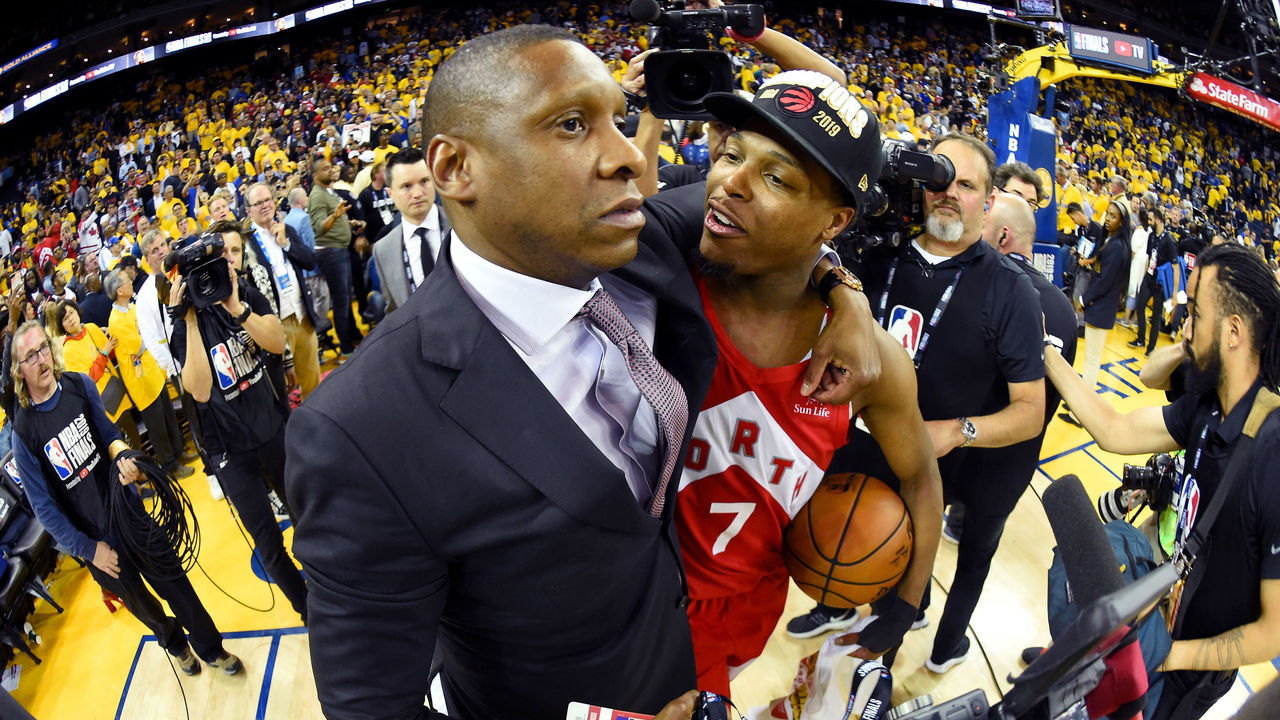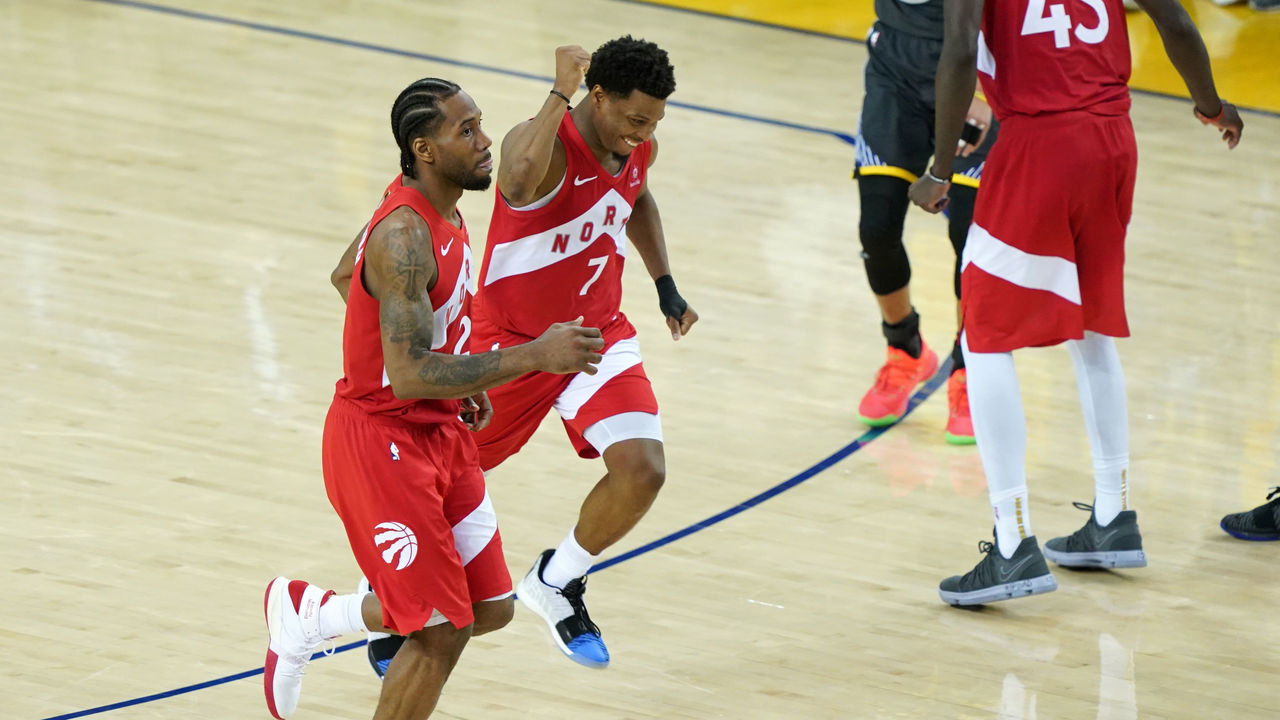The trade Ujiri made - and the one he didn't - led the Raptors to a title
Try to trace the Toronto Raptors' journey, from where they began to where they are now, and you'll find any number of forks in the road; pivot points that might have, in an alternate universe, sent it all careening down a different path.
What if they hadn't flipped Antawn Jamison for Vince Carter? What if Tracy McGrady had stayed? What if Vince had made the shot against Philly? What if they'd drafted anyone other than Rafael Araujo? What if Bryan Colangelo hadn't been duped by Andrea Bargnani's Caliper test?
Let's pare it down a bit, though. The 2019 Raptors, newly crowned NBA champions, are the sum of several years' worth of decisions, but they are defined most of all by two trades - one that was consummated, and one that wasn't.
In late 2013, in his first year as Raptors general manager, Masai Ujiri was eying a teardown. He'd vowed not to get "trapped in the middle ... stuck in no man's land." Meanwhile, the team was scuffling, and Ujiri saw a chance to precipitate a nosedive straight into draft-lottery riches. He'd already dealt away Rudy Gay, and the next to go would be Kyle Lowry, the talented but undersized point guard with a stocky build and a reputation for bullheadedness.
The Raptors had acquired Lowry the previous season, only after their convoluted gambit to sign Steve Nash had failed. At the time, Lowry saw Toronto as a brief stopover on his career voyage; a place he'd leave far behind after playing out the string on his contract.
Ujiri was ready to oblige by sending him to the New York Knicks in exchange for Iman Shumpert, salary filler, and a first-round pick. Lowry had his bags packed for New York before Knicks owner James Dolan famously felt a chill run up his feet at the 11th hour, wary of being fleeced by Ujiri. So, Lowry unpacked, resettled, refocused, and accepted the general manager's challenge to become a leader. That would-be tanking season ultimately ended with him crumpled on the floor after getting his attempted series-winner blocked by Paul Pierce at the buzzer in a Game 7 against the Brooklyn Nets.
A few weeks later, he re-upped for four more years in Toronto.
It's easy to forget, but before DeMar DeRozan stayed, Lowry stayed. Even if he wasn't a star in the conventional sense, the optics of his decision mattered. At a time when the memory of Chris Bosh leaving for Miami was still fresh, and when the perceived drawbacks of playing in Canada (lack of exposure, high taxes, cold weather, bad cable, even the freaking metric system) were still ubiquitous among American athletes, Lowry decided to put down roots. Five years later, he took the floor in the NBA Finals as the lone remaining member of that 2013-14 team. In between, he'd made five All-Star teams and an All-NBA team, had led the franchise to four successive 50-win seasons, had hit more 3-pointers than all but five players in the league, and had accrued more win shares than all but 10.

Season after season, Lowry carried the Raptors to top-10 ratings at both ends of the floor by leveraging every small advantage he could find. Turning his pull-up game into a devastating weapon certainly helped, but so did perfecting the pocket pass, drawing charges better than anybody else, jailing defenders on his ample hips, drawing cheap fouls, pulling the chair, and throwing borderline-reckless hit-aheads the length of the court. Those Raptors teams were regarded as disappointments because of their numerous playoff flameouts, but Lowry made them better than they had any right to be.
In Game 5 of the Finals on Monday, he once again found himself with a chance to win a series (albeit a slightly more consequential one) at the buzzer. Once again, he had his shot blocked. But this time, he got another chance.
Three nights later, he set the tone with 15 first-quarter points, canned his first four 3-pointers, torched every defender he saw at the point of attack, diced them up with his passing in the pick-and-roll, boxed out dudes a foot taller than him, and finished with 26 points, seven rebounds, 10 assists, and a game-high plus-16 rating in a title-clinching Game 6 win over the Golden State Warriors.
The Lowry story is instructive for a bunch of different reasons, but none more than this one: You need intelligence and foresight to build a winning basketball team, but you also need luck. It turns out Ujiri's best move was the one Dolan prevented him from making.
Or at least, it was until last summer, when through an extraordinary confluence of circumstances, Ujiri saw a once-in-a-decade opportunity to acquire a superstar in his prime without losing any of his best prospects. All it cost was the player who'd become a symbol of the Raptors' perpetual climb, who'd helped build their culture from the ground up, who'd become the soul of the team, and who'd become Lowry's best friend. Trading DeRozan made perfect basketball sense, but that doesn't mean it came without risk, or without loss.
Kawhi Leonard was a year away from free agency, coming off a nine-game season, and unmoved by the prospect of playing in Toronto. DeRozan publicly bared his emotional wounds. The fan base had to say goodbye to a player they'd loved in large part for how openly he'd loved them in return. Lowry didn't speak to Ujiri for a while. The season was instantly placed in a pressure cooker, with the stakes amplified beyond precedent in the franchise's history. It was a loss of innocence, in a way.
Time and again, Leonard rose up to meet those stakes. His excellent regular season - played on a carefully calibrated workload - gave way to an all-time postseason, in which he toppled one giant after another with an ungodly combination of strength, control, shot-making ability, and quick-twitch jukery. He wound up playing nearly 1,000 playoff minutes, half of them on a balky knee, and finished with the third-highest single-postseason scoring total (732) in league history on 61.9 percent true shooting.
His defensive work on Giannis Antetokounmpo flipped the Eastern Conference finals against the Bucks. His uncanny knack for vacuuming up timely offensive rebounds helped salt away wins over demoralized opponents. He hit huge shots, in huge moments, over and over and over. By the time all was said and done, Leonard had forced his way into the best-player-in-the-world conversation, and had earned a second Finals MVP award - but one that should carry more heft than the first one in San Antonio, given the dramatically increased role he played for this Raptors team. Even knowing how good Leonard had been at his peak, it was hard to imagine the trade working out this well. His season wasn't just a validation of Ujiri's bet (which needed no validation), but a rebuke to skeptics who questioned his motives for sitting out last year.
Along the way, even before he helped the Raptors complete their maiden championship quest, Leonard lifted the psychic fog that had hung over the fan base for so long; the feeling that the Raptors were doomed to fail simply because they were the Raptors - a sad-sack franchise that had managed to become just good enough to serve as LeBron James' doormat each spring. The only way to overcome that feeling, apparently, is to face a situation you've seen so many times before, and to flip the outcome on its head.
Leonard's free-agency plans are still a mystery, but so much is already written in stone. Whatever comes next, he'll be firmly entrenched in Raptors lore, and just as important, the Raptors will be an enormous, enduring part of his legacy. Toronto will forever be the place where he found vindication, where he definitively put his stamp on the NBA, and where he stopped another dynasty in its tracks. It's where he hit The Shot and That Other Shot, and had That Dunk and That Third Quarter. It doesn't really matter how much that means to Leonard personally, because it means a great deal to everyone else. That's the one part that isn't up to him.

Toronto was expected to be a detour for Leonard, but it was supposed to be a detour for Lowry, too. Seven years on, Lowry's still traversing the scenic route.
It was also unclear at first how fruitful their partnership would be. Both players seemed to approach it tentatively, with Lowry still feeling burned by the way DeRozan had been treated, and Leonard still adjusting to a situation he'd never expected to find himself in. Their on-court dynamic, too, was often strained. Lowry was running an uptempo, pass-happy offense, while Leonard liked to slow things down and probe in isolation. Each seemed to play better with the other on the bench.
It was more natural on defense, where their collective intelligence spawned a help-and-recover synergy from the start, allowing them to spring traps on unsuspecting souls and team up for deflections and steals. Things developed slowly at the offensive end, but the two eventually grew attuned to each other's rhythms. Lowry figured out how to relocate effectively around Leonard's defense-collapsing drives and post-ups, scampering into open spaces where he knew Leonard was comfortable delivering passes. Leonard started to look for Lowry more, and made frequent use of him as a screener. Lowry sought out more opportunities to assert himself in the offense when Leonard was on the floor. Their two-man actions, especially in the corners, became staples. By season's end, they'd achieved symbiosis.
Lowry also spoke constantly about the calming influence Leonard had on him; how he was learning from Leonard to keep an even keel and stay in the moment. That feeling trickled down and permeated the entire team. It became perhaps the defining feature of their playoff run.
They say it's better to be lucky than good, but it's best, of course, to be both. On Thursday night at Oracle Arena, Ujiri stood on the dais with Lowry and Leonard - the biggest representations of his good fortune and good foresight - and celebrated a championship. It was hard not to muse at how they'd all gotten there.
There would've been no Leonard trade without Lowry, who made the Raptors good enough to go for it. There would've been no Lowry championship without Leonard, who was singularly gifted enough to put these Raptors over the top. And none of it would've been possible without the key decisions made by Ujiri.
And James Dolan.
HEADLINES
- Senators' Tkachuk says he'll be ready for playoff opener vs. Leafs
- Stat leaders, select award winners finalized for 2024-25 season
- Rocker earns 1st MLB win, Bochy ties Baker as Rangers sweep Angels
- Final NHL draft lottery odds: Sharks have best chance at No. 1 pick
- Ruff earns 900th victory in Sabres' season-ending win vs. Flyers